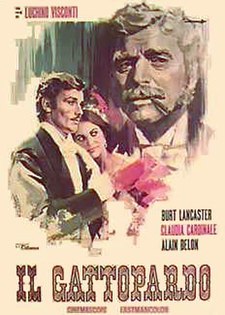The Leopard (1963 film)
| The Leopard (Il Gattopardo) |
|
|---|---|

original film poster
|
|
| Directed by | Luchino Visconti |
| Produced by |
Goffredo Lombardo Pietro Notarianni |
| Written by |
Pasquale Festa Campanile Enrico Medioli Massimo Franciosa Luchino Visconti Suso Cecchi d'Amico |
| Based on |
The Leopard by Giuseppe Tomasi di Lampedusa |
| Starring |
Burt Lancaster Claudia Cardinale Alain Delon Serge Reggiani Mario Girotti Pierre Clementi |
| Music by | Nino Rota |
| Cinematography | Giuseppe Rotunno |
| Edited by | Mario Serandrei |
| Distributed by |
Titanus (Italy - Theatrical) Medusa Entertainment (Italy - Current) 20th Century Fox (U.S.) |
|
Release date
|
|
|
Running time
|
161 Min (US Theatrical Release) 185 Min (US Uncut Version) 195 Min (French Version) 205 Min (Full Version) |
| Country | Italy |
| Language | Italian |
| Box office | $1,800,000 (US/ Canada) 3,649,498 admissions (France) |
The Leopard (Italian: Il Gattopardo, "The Serval"; alternative title: Le Guépard) is a 1963 Italian epic film by director Luchino Visconti, based on Giuseppe Tomasi di Lampedusa's novel of the same name.
Sicily, 1860. The corpse of a Royalist soldier is found in the garden of the villa of Don Fabrizio Corbera, Prince of Salina (the gardener quips that these soldiers stink as much in death as they do in life). As the Prince's large family enjoys the customary comforts and privileges of an ancient and noble name, including private services with their Jesuit priest, war has broken out between the King's army and the insurgent volunteer redshirts of Giuseppe Garibaldi. Among the rebels is the Prince's remarkably handsome and dashing nephew, Tancredi, with whose romantic politics the Prince shares some whimsical sympathy (and a good deal of material support—Tancredi is a notorious spendthrift).
Moved by the political uprising, the Prince departs, with his priest as cover, for a nearby town where he engages in an assignation with a local woman; he complains that, despite siring seven children upon his devout Catholic wife, he has yet to see her navel. Garibaldi's army conquers the city and Sicily from the Bourbons, but the mood is muted and the prospects murky. The Prince muses upon the inevitability of change, with the middle class displacing the hereditary ruling class while on the surface everything remains the same. His priest worries about the future of the church under the Garibaldini, but the Prince assures him that it is only his class who has anything to lose.
Refusing to bend to the tide of necessity, the Prince departs from Palermo for his summer palace at Donnafugata. The glamour of his name is still such as to lift roadblocks and allow passage to his family across disputed terrain. Arriving in the hilltop town, the Prince establishes his life just as it was always lived—hunting, social visits, etc.—despite the fact that a new national assembly has called a plebiscite which (thanks to the corrupt zealotry of the town's leading citizen, the incorrigibly bourgeois Don Calogero Sedara), the nationalists win 512-0. Sedara's grip on power and property in the region is matched only by his fawning sycophancy toward the Prince, whose incontestable nobility of character and ancestry leave Sedara looking distinctly plebeian.
...
Wikipedia
